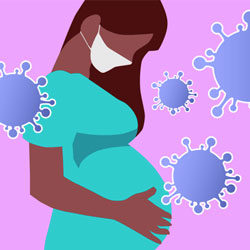By Marie Rosenthal, MS
Pregnant women may be at greater risk for severe illness if they contract COVID-19 than women who are not pregnant, according to a presentation at ECCMID 2022, European Congress of Clinical Microbiology & Infectious Diseases (ECCMID) in Lisbon, Portugal (oral abstract L0401).

The findings appear to be independent of key risk factors including age, underlying illnesses, vaccination status and virus variant. However, vaccination can mitigate this risk, according to the researchers. Women were half as likely to be hospitalized after just one dose of the COVID-19 vaccine, and even less likely with two or more doses. Similarly, women were more than half as likely to be admitted to the ICU when they had one dose of the vaccine, and even less likely with two or more doses.
The time-matched cohort study by Kiera Murison, an MPH candidate at the University of Toronto, and her colleagues included data on more than 13,600 women from Ontario’s Case and Contact Management database. The researchers analyzed data from the population-based SARS-CoV-2 database between March 16, 2020 and Jan. 4 2022, which holds records for more than 1 million confirmed COVID-19 cases in Ontario (population over 14 million).
Because the likelihood of vaccination and the dominant circulating viral strains changed over time, researchers conducted a time-matched cohort study evaluating the relative risk for severe illness in pregnant women with COVID-19 matched with nonpregnant females (10-49 years old) with SARS-CoV-2 infection by date of laboratory-confirmed SARS-CoV-2.
Modeling was used to estimate the risk for severe COVID-19 outcomes—hospitalization and ICU admission—in pregnant women and nonpregnant controls after adjusting for age, other illnesses, healthcare worker status, vaccination and infecting variant. There were fewer than five maternal COVID-19 deaths during the study, so the risk for dying during pregnancy could not be evaluated.
The analyses found that although pregnant women were half as likely to have a SARS-CoV-2 infection relative to the general population (probably due to being more careful, social distancing and other measures), they were almost five times as likely to be admitted to hospital with COVID-19 as their nonpregnant peers, and more than six times as likely to require intensive care.
Additional analyses comparing women with similar comorbidities found healthy pregnant women were more than five times as likely to be hospitalized as healthy nonpregnant women, but pregnant women with underlying illnesses were only twice as likely to be hospitalized as their nonpregnant peers with comorbidities.
“These findings suggest that in otherwise healthy women, pregnancy itself seems to be a factor that increases illness severity, while among women with comorbidities, it becomes one of several factors that augment risk,” Ms. Murison said. “Our findings underscore the need for clear accurate information to reassure pregnant women and tackle concerns about COVID-19 vaccine safety.”
The researchers said the findings emphasize the importance of pregnant women being vaccinated against COVID-19.
This was an observational study, and as such could not establish causation.
Maternal-Fetal Antibodies
In related news, most women who catch COVID-19 when pregnant pass antibodies to their unborn infants, according to another study presented at ECCMID 2022 (abstract 03428).
Antibodies to infections are known to be transferred from mother to baby during the last three months of pregnancy, providing the baby with some protection against that particular illness when they are born.
Little is known, however, about how well SARS-CoV-2 antibodies are transferred from mother to child, in either vaccinated or unvaccinated populations.
This study focused on pregnant women who were infected before vaccines were widely available.
Liliana Gabrielli, MD, and her colleagues at the IRCCS St. Orsola Polyclinic, University of Bologna, in Italy, studied more than 4,000 women who gave birth in Bologna between July 1, 2020 and March 31, 2021.
The women underwent polymerase chain reaction (PCR) tests to determine current infection. They also gave blood samples, which were tested for antibodies that would indicate past infection.
All of the newborns were tested by PCR for COVID-19. Newborns whose mothers tested positive for antibodies were also tested for antibodies. The results showed:
- 136 of the women (3.4%) had antibodies to the coronavirus in their blood;
- 26% of these women had both immunoglobulins IgG (older infection) and IgM (more recent/current infection) antibodies; and
- 74% of the women had IgG antibodies but were IgM-negative.
Blood samples were obtained from 73 infants born to mothers with antibodies to SARS-CoV-2. None of these infants had IgM antibodies. This was expected because IgM does not cross the placenta. However, 11 babies (15%) were IgG- and IgM-negative. The other 62 (85%) were IgG-positive. All 73 babies had negative PCR results when tested shortly after birth, indicating they did not have COVID-19 and the antibodies had been passed to them by their mothers, rather than being made by themselves.
Although antibody transfer was high, levels in the newborns were slightly lower than in their mothers.
“This study of pregnant women and their newborns, which was carried out in the pre-vaccination era, found that 3.4% of the women had COVID-19 during pregnancy,” Dr. Gabrielli said.
“Most of these women passed antibodies to their babies. However, the protection provided by these antibodies will gradually decrease over time and disappear within 100 days of birth, in most cases.”
{RELATED-HORIZONTAL}
